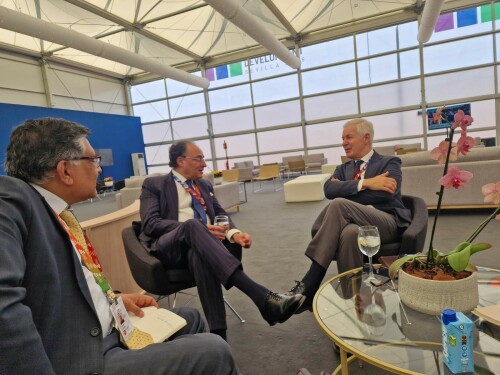Finance Minister Engages in High-Level Meetings at FFD4 in Spain
On the sidelines of the Fourth International Conference on Financing for Development (FFD4) in Seville, Spain, Finance Minister Muhammad Aurangzeb conducted several significant bilateral discussions and strategic sessions. According to a statement released by the Finance Ministry on Thursday, these meetings sought to deepen strategic alliances with international partners and institutions in crucial areas such as development finance, trade, climate resilience, and strengthening institutional capabilities.
Representing Pakistan at the FFD4, Aurangzeb engaged in a comprehensive bilateral exchange with Eelco Heinen, the Finance Minister of the Netherlands.
Strengthening Ties with the Netherlands
The discussion centered on enhancing the longstanding and amicable relations between the two nations, particularly in trade, development initiatives, climate change adaptation, and bolstering institutional frameworks. Both parties exchanged views on strengthening economic cooperation, technical collaboration, and exploring opportunities for enhanced partnerships in areas like blended finance, climate-related funding, and digital advancements.
Pakistan expressed a strong interest in leveraging Dutch expertise in agricultural technology, water resource management, and the digitization of public sector services. The Dutch Finance Minister affirmed his nation’s commitment to Pakistan’s structural reform plans, emphasizing the necessity of policy stability, transparency, and facilitating investment inflows.
Discussions with World Bank Leadership
Aurangzeb also convened with Axel van Trotsenburg, a Senior Managing Director at the World Bank, during the FFD4 conference. He expressed gratitude for the World Bank’s ongoing support for Pakistan’s development goals. He provided updates on the successful evaluation of the International Monetary Fund (IMF) Extended Fund Facility (EFF) program and the continuing reforms under the Resilience and Sustainability Facility (RSF).
He also drew attention to the introduction of Pakistan’s National Green Taxonomy, which was created with assistance from the World Bank. This taxonomy is intended to provide guidance for environmentally conscious investments and is anticipated to be approved shortly. Aurangzeb welcomed the World Bank’s approval of the new 10-year Country Partnership Framework (CPF 2026–2035), which prioritizes key areas such as combating child stunting, reducing learning disabilities, enhancing climate resilience, creating fiscal space, promoting decarbonization, and attracting private investment.
Collaboration with IFAD
In a separate meeting, the finance minister had extensive discussions with Alvaro Lario, President of the International Fund for Agricultural Development (IFAD), a specialized UN agency focused on rural development and transforming food systems. Both parties assessed the enduring collaboration between Pakistan and IFAD, with Aurangzeb acknowledging IFAD’s continuous assistance through six ongoing projects in Pakistan. The meeting encompassed a wide array of IFAD-supported projects in Pakistan, including policy assistance, vocational education, community infrastructure development, access to financial resources, climate-smart agricultural practices, value chain enhancement, and resilience against climate-related shocks.
Engagement with the International Chamber of Commerce
Furthermore, Aurangzeb met with John W.H. Denton AO, Secretary-General of the International Chamber of Commerce (ICC). They explored avenues for greater collaboration in trade facilitation, SME advancement, investment promotion, and the ICC’s role in supporting Pakistan’s economic transformation. They specifically emphasized private sector involvement, adherence to international standards, and institutional capacity enhancement to unlock new opportunities for sustainable growth and inclusive development in Pakistan.



Comments (0)
No comments yet. Be the first to comment!
Leave a Comment